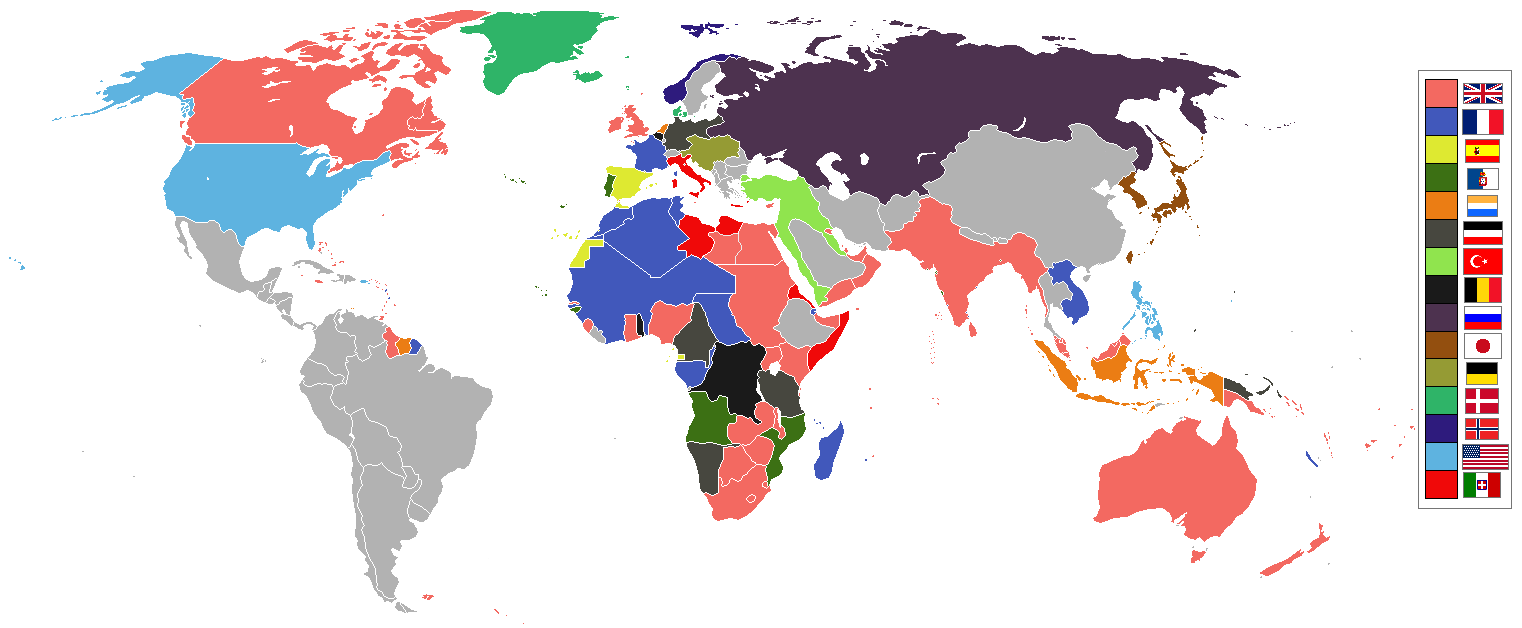More languages
More actions
World War I, also known as the First World War and abbreviated as WW1 or WWI, was a conflict taking place from the years of 1914 to 1918. It is called a world war due to the fact that most countries in the world at the time directly participated in the conflict. Most of these participants were colonies of the main powers, as much of the conflict took place in Europe. World War I ended with a series of revolutions, including the Irish revolution, the Russian revolution, the German revolution, and the Turkish revolution.
Causes

Although the German 'blank check' for Austro-Hungary to initiate aggression against Serbia was the immediate cause, structural issues of the world capitalist order at the time can be identified. The main branches of bourgeois historiography pin down Imperial Germany as responsible for the war , noting the firebrand nature of Kaiser Wilhelm II (The Fischer thesis), or surmise that the war occurred due to a diplomatic breakdown, with each side 'sleepwalking' into the war. As the Industrial Revolution was winding down and several countries were turning towards imperialism to keep capitalism afloat, others were going to their industrial revolution still, which they had started at a later date (such as Germany). The former countries had already colonised the world and so had enjoyed the benefits of imperialism for decades. The latter countries on the other hand were barely reaching their imperialist phase, and as such entered the war to redistribute colonial possessions to their advantage.
Alliances
Two major alliances faced off in the conflict. The Triple Entente, composed of:
Against the Triple Alliance, composed of:
Major Events
The 'July Crisis'
Entry of Italy and the Battles of the Isonzo
The Brest-Litovsk Treaty and withdrawal of Russia
Reliance on colonies
Colonies played a primordial role in this conflict, with their masters requiring soldiers and resources be sent to aid in the war effort.
A major rebellion against the tsarist colonial government broke out in the Central Asian region in 1916. Another uprising against the British colonists, the Easter uprising also took place in 1916.
In his book The Wretched of the Earth, Franz Fanon recalled a poem by Keita Fodeba, African Dawn, in which a Malian youth is sent to fight for France in World War 1. Picked by the village for his bravery, he leaves in a ship soon after heading for the French front. During his time in the army, his wife receives sparse letters from him and fears for the worst every day. Eventually near the end of the war, she learns that he will be coming back. But on the day his ship arrives back in his home country, he is killed in an undisclosed altercation with two white colonial police officers.
Fanon notes that "There is not a single colonized person who will not receive the message that this poem holds." He further writes that "this is Sétif in 1945, this is Fort-le-France, this is Saigon, Dakar, and Lagos".
Consequences of World War I
Ultimately, the forces of the Triple Alliance failed to upset the balance like they sought to, instead surrendering in 1918 and losing their colonial possessions. German and Turkish colonies were redistributed among the remaining imperialist powers in the following way: Syria and Lebanon mandates were taken by France, Rwanda and Burundi to Belgium , Palestine,Tanganyika, Cameroune and Togoland mandates were taken over by the British Empire (along with German Southwest Africa being absorbed by the dominion of South Africa). The infamous Versailles treaty was imposed upon members of the Alliance.
Faced with heavy penalties from the victors and coupled with the fact that they had become unable to enter an imperialist phase and sustain capitalism, fascism was able to take hold in Germany, Italy, and Austria, ultimately leading to World War II. It should be noted that fascism was already starting to appear in Italy under an ultra-nationalist veneer, and as such it wasn't WW1 by itself that was the triggering factor for fascism as an ideology to exist.
Resistance to World War I
Several European socialist parties confirmed their commitment against the warmongering machinations of their respective ruling classes at the Basel Conference in 1912. However, most parties turned back on this commitment and joined their ruling classes to wage war against workers from other countries. Lenin organised the Zimmerwald conference in 1915 to organise remaining anti-war socialists and continued to call for the imperialist war to be turned to Russia, after having undergone the Bolshevik Revolution, withdrew from the war in 1917 and appealed to all countries to cease the war. The last phase of the war was very revelational in demonstrating the nature of the war while the Entente continued to engage with Germans on the Western front, Reichswehr soldiers were allowed to occupy the Baltics to stave off the Bolshevik "menace."
